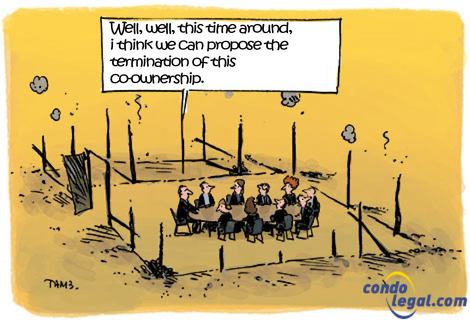Double majority
 The Civil Code of Quebec, in articles 1098 and 1108, establishes a "double majority" for certain significant decisions of the co-ownership assembly, requiring a consensus in both the number of co-owners and voting rights. Article 1098 of the Civil Code of Quebec deals with major decisions such as changing of use of the immovable, while article 1108 of the Civil Code of Quebec allows for the termination of co-ownership. These provisions ensure thoughtful decision-making, protect the individual rights of co-owners, and promote sound management of the co-ownership.
The Civil Code of Quebec, in articles 1098 and 1108, establishes a "double majority" for certain significant decisions of the co-ownership assembly, requiring a consensus in both the number of co-owners and voting rights. Article 1098 of the Civil Code of Quebec deals with major decisions such as changing of use of the immovable, while article 1108 of the Civil Code of Quebec allows for the termination of co-ownership. These provisions ensure thoughtful decision-making, protect the individual rights of co-owners, and promote sound management of the co-ownership.
Object
The double majority of articles 1098 and 1108 of the Civil Code of Quebec is a very strong majority compared to that of article 1096 of the Civil Code of Quebec (absolute majority) or that of article 1097 of the Civil Code of Quebec (enhanced majority). It requires a broader adherence on the part of the co-owners. The reason for this is that the decisions subject to this majority are decisions with significant consequences, requiring a certain consensus from the community. The decisions concerned by this majority are:
Method of calculation
This majority refers to two distinct criteria: the number of owners and the percentage of votes. For a resolution to be adopted under the principle of double majority, it must gather the approval of at least three-quarters (75%) of the co-owners, whether they are natural person or legal person. Additionally, the votes in favor of this resolution must represent at least 90% of the total votes within the co-ownership. This rule is thus termed "double majority."
Examples
Let's consider a co-ownership with 20 co-owners, totaling 2000 votes. For a decision to be made according to the double majority rule, it would be necessary that:
- At least 15 co-owners (75% of 20) vote in favor of the decision, as 75% of 20 equals 15. This meets the criterion of the number of owners.
- The favorable votes must represent at least 1800 votes (90% of 2000), which meets the criterion of the percentage of votes.
If, for example, 16 co-owners vote in favor of the decision (which is more than the 15 required) but their votes account for only 1700 votes (which is less than the 1800 required), then the double majority would not be achieved, even though the majority in number is exceeded. Therefore, the decision would not be adopted according to the double majority principle.
 WHAT YOU SHOULD KNOW ! The "double majority," as defined by articles 1098 and 1108 of the Civil Code of Quebec, sets a high consensus threshold for critical decisions within a condominium. It requires the agreement of at least three-quarters (75%) of all co-owners and that their votes account for at least 90% of the total votes within the co-ownership.
WHAT YOU SHOULD KNOW ! The "double majority," as defined by articles 1098 and 1108 of the Civil Code of Quebec, sets a high consensus threshold for critical decisions within a condominium. It requires the agreement of at least three-quarters (75%) of all co-owners and that their votes account for at least 90% of the total votes within the co-ownership.
 WHAT TO KEEP IN MIND: This "double majority" underscores the significance of decisions such as changing the destination of the immovable, alienation of common portions the retention of which is necessary to maintain the destination of the immovable, amendment to the declaration of co-ownership to permit the holding of a fraction by several persons having a periodic and successive right of enjoyment and the end of the co-ownership
WHAT TO KEEP IN MIND: This "double majority" underscores the significance of decisions such as changing the destination of the immovable, alienation of common portions the retention of which is necessary to maintain the destination of the immovable, amendment to the declaration of co-ownership to permit the holding of a fraction by several persons having a periodic and successive right of enjoyment and the end of the co-ownership
 WARNING ! Certain declarations of co-ownership registered before January 1, 1994 provide for a unanimous vote for decisions to change the destination of the immovable. Under section 53 of the Act respecting the implementation of the reform of the Civil Code, this unanimity remains as an exception.
WARNING ! Certain declarations of co-ownership registered before January 1, 1994 provide for a unanimous vote for decisions to change the destination of the immovable. Under section 53 of the Act respecting the implementation of the reform of the Civil Code, this unanimity remains as an exception.
Return to the super-factsheet ''Majorities required in Meeting ''





